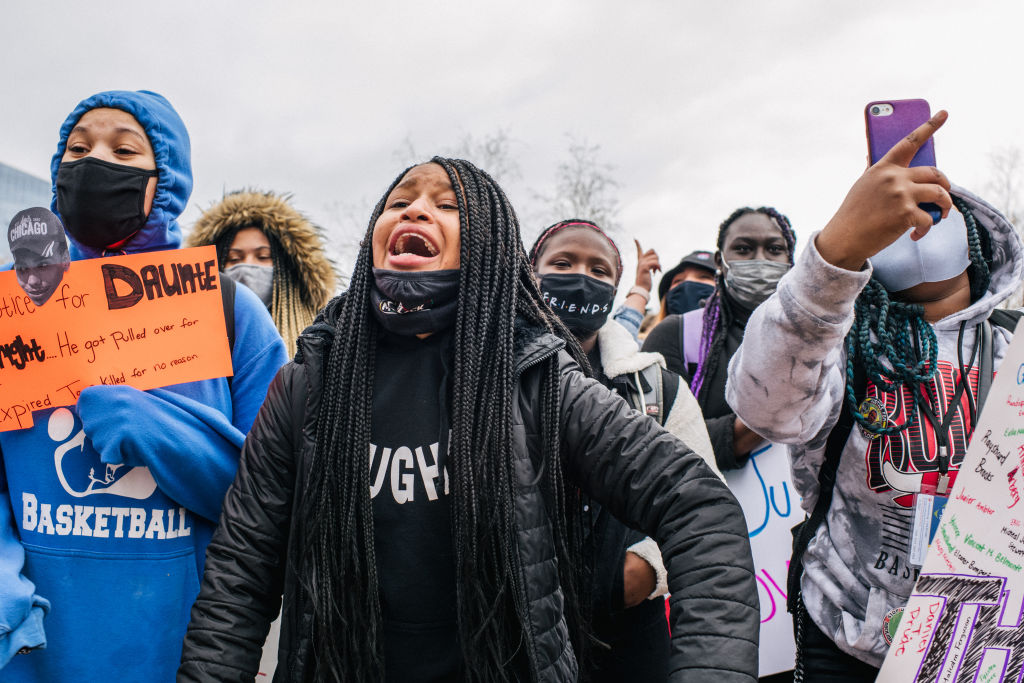Equality In Servitude

From citizen competence to therapeutic despotism
This article appeared originally in RealClearPublicAffairs as part of its 1776 Series, which seeks to explain the “major themes defining the American mind.”
A dozen or so years ago, I took temporary leave from Georgetown University and moved to Iraq for two years to preside over The American University of Iraq-Sulaimani. Some of the young men and women enrolled in our fledgling university carried the double burden of having survived both the American invasion and the Kurdish Civil War that had occurred twenty years earlier. To give a sense of the difficulties the university had to contend with, we found it necessary to develop a scholarship category—“Anfal students”—for those whose parents had been gassed to death by Saddam Hussein’s cousin, nicknamed “Chemical Ali,” during the Kurdish genocide in Halabja and elsewhere. More than 175,000 Kurds died in that offensive, whose name, “Anfal,” means “the spoils of war.” Those who died in Halabja convulsed, fell to the ground, and choked in their own green vomit before succumbing. In America, we talk of “hardship” students. Few have experienced trauma of the kind our students in Iraq endured.
Teachers at the American University of Iraq were of two sorts. There were those who sympathetically said to their students: “We dimly understand what you have been through, but the only way we can help you is by upholding high standards, so that you can develop the competence you will need to live well.” And there were others whose guilt about the American invasion and its consequences was all-consuming. For these teachers, the development of student competence was of secondary importance. What mattered was that they be merciful and empathetic toward their students, who were, after all, innocent victims. These teachers did not require that their students hand in their work on time, or at all. They ignored cheating. An inordinate amount of their time was spent making tearful pleas, in the hope that administrators would be lenient when student grades fell below the level required to retain scholarships.
Iraq had its divisions, and the American University of Iraq had them, too. One faction consisted of tough-love teachers and their hungry students; the other consisted of teachers and students who were co-dependent on one another. The teachers in this latter group declared that their students could not succeed without softened standards, and their students depended on these softened standards, not hard work, to get the passing grades they needed. Imagine how these teachers would have responded if their co-dependent students came to class one morning and said: “Your tears on our behalf do us no good. We can and must succeed without your ‘help.’ Regardless of what has befallen us, we are not innocent victims. Our dignity is not measured by what we have suffered, but by how we will respond to it. Suffering is not an argument against standards. Treating us as innocent victims may bring meaning to your life, and it pays you well. But you may not purchase meaning in your life at the expense of our lives becoming whole, and decent, and good, which can only happen if we rise above our afflictions.”
Therapy vs Edification
When competence is your goal, neither guilt nor victimhood should have a place. Standards and goals must be respected and maintained. When the co-dependency of guilt and victimhood metastasize in your university, you ask of your students something anathema to education – that each day they deepen their awareness of their own victimhood, and that they pay ever more tuition to the army of mental health administrators and woke professors who fatten off of their misery. Seek to produce competent students, and you honor your commitment to higher education; seek to produce innocent victims, and you transform your university into an institution of higher infantilization—an exercise in therapeutic redemption, not education. “We, the Board Directors of this once-hallowed university, certify that you were admitted, not because of your grades or SAT scores, which are racist, but because you saw yourself as an innocent victim or knew what sort of social-justice-genuflecting would be necessary if you were not; and we certify that you graduated not more competent but more righteous than when you arrived. Now go forth and subdue the earth, enchained by your student debt and your frailty.”
Today, not only our universities, but indeed in the whole of America, we are engaged in a fateful struggle that revolves around the answer to one question: Does our nation go forward committed to what, in American Awakening (Encounter Books, 2020), I have called “the politics of competence,” or to “the identity politics of innocence,” whose false promise of justice has captivated fully half of the America population? Through the identity politics of innocence, we will amplify misery, division, and strife. Through the politics of competence, we will build a world together that we can scarcely imagine. These are our two alternatives. They sit like a devil on one shoulder and an angel on the other, bidding us to choose. The choice cannot be evaded.
Set aside for a moment the identity politics of innocence. What does citizen competence look like, and how does it develop? Let us imagine two distinct futures, each of which have equality as their watchword. One is based on equality in freedom; the other is based on equality in servitude. These were the alternatives Alexis de Tocqueville laid out with depth and eloquence in Democracy in America (1835). Because his prophetic anticipation of the future is unrivaled, it is worth revisiting his thinking today. Equality in freedom rests on the firm foundation of competence. The carpenter or stone mason with weathered hands who assures the nervous homeowner that a challenging project can be done well, and on time; the hardware employee who knows the content and use of everything in every aisle of his store; the professor who, without notes, speaks simply and beautifully about difficult ideas he has wrestled with for decades; the nurse whose gentle yet firm bedside manner has been earned through years of trial, and which can never be rendered in a “how-to” manual; the mother whose saint-like patience and strength radiate outward for all to see; the pastor, priest, or rabbi whose elegant and comforting words reveal a depth of spirit that cannot be taught but only witnessed – these examples of competence and millions more that are each day acted out in America are what make equality in freedom possible. Equality, because citizens are equally respectful of all men and women with useful and noble competences; and freedom, because the tasks of government can only remain modest, and the arena for freedom expansive, when competent citizens care for themselves, for their neighbors, and for the world they share.
Undermining the Citizenry
Contrast this healthy, life-giving, confidence-inspiring arrangement with what Tocqueville called an equality in servitude. Here, citizens are indeed equal—not because of the plurality of their competencies, but because they are all equally incompetent and co-dependent on the state and its agents for “help.” How does this infantilized, co-dependent form of equality arise? Tocqueville’s account in 1835 stands firm nearly two centuries later: to destroy citizen-competence, the mediating institutions through which it is formed—families, churches and synagogues, civil associations, along with our commercial and educational institutions—must be relentlessly undermined. As they are hobbled and citizen competence wanes, the state confidently steps up and declares that it must intervene. This has been the central argument of Progressivism for over a century. Expert competence and guidance, not citizen competence, would fulfill The Promise of American Life, to cite the title of Herbert Croly’s 1909 classic statement of the idea. Implementing it has inaugurated a vicious cycle of cause and effect, which has yielded not an efficient national government but ever-more expansive and expensive government programs that diminish citizen competence and infantilize every group they touch.
Don’t the examples of our indigenous American Indians and a shamefully large swath of black America since the onset of the so-called Great Society Program in 1963 show that the best way to produce permanent co-dependency is for the state to overrun the mediating institutions through which citizen competence is developed? Systematic racism does not afflict our nation; the systematic undermining of the mediating institutions of our most vulnerable citizens by the state does. Such heavy-handed paternalism is “the bigotry of soft expectations,” as the late Senator Daniel Patrick Moynihan called it.
Politics of the Scapegoat
What about the identity politics of innocence? How does it undermine the politics of competence? Confusion abounds about the Left’s contemporary political project. The identity politics of innocence is not Progressive; nor is it Marxist. It is not Progressive, because it seeks to overthrow the criteria of competence itself; it is not Marxist, because instead of providing a secular version of Christianity, in which the sufferings of history are brought to a triumphant end through revolution, identity politics appropriates from Christianity the claim that sin must be paid for by a sacrifice, by a scapegoat. For Christians, Christ is the divine scapegoat who, through His death, “takes away the sins of the world” (John 1:29). For the identity politics Left today, the scapegoat is the white heterosexual male. Scapegoat him, purge him from the body social, and the world will heal. Not surprisingly, every major action item of the Democratic Party today (and the Left more broadly) is traceable to the supposed toxicity that the white heterosexual male has wrought. The Left’s pushback against national borders; its insistence that fundamental political and economic transformations are necessary to address climate change; its disgust with “dirty” fossil fuels; its demand for wealth redistribution; and its resolve that every mediating institution in which citizens gather must be altered so as to become “inclusive” – all of these have at their root the supposition that the nation-state, market commerce, the petrochemicals that fuel it, the conventional generative family, our civic institutions, and our religious institutions are unclean or obsolete because of the hand that white, heterosexual man has had in building and maintaining them. This Manicheanism, this perverse art of demonization, is hardly “inclusive.”
The dangerous delusion of the Left today, which will eventually culminate in violence – as every revolutionary attempt to purify and heal the world always does – is that sin is someone else’s problem, not one’s own, as Christianity claims. This utter lack of self-reflection, of narcissistic indulgence that takes the form of projecting the darkness that resides in every human heart onto just one group of people, is a pathology that we can only hope will be analyzed in depth after the violence it will justify abates. Shortly after World War II, researchers went looking for “the authoritarian personality,” in the hope that by discovering its roots, bloodshed of the sort that the war brought could be averted in the future. I suspect that in the next several decades, researchers will look for the roots of “the identity politics personality” with similar hope.
Identity politics in its many guises—“wokeness,” “cancel culture,” the frenzied quest for “social justice,” DEI (“diversity, equity, and inclusion”), “critical race theory,” and so on—share in common the view that identity is about more than the kind you are. Identity politics is a claim about the relative purity of one kind in relationship to another kind. If you are a white, heterosexual man, for example, you receive zero innocence points on your Intersectional scorecard. You are the prime transgressor, in principle beyond redemption. All others stand in a peculiar relationship to you and receives innocence points in proportion as they can establish their distance from you, the common object of their revulsion.
If you are a woman, you receive one “innocence point.” Wasn’t it the lesson of Bret Kavanaugh’s September 2018 Senate confirmation hearing that, facts aside, every man really is a rapist, deny it though he may? If you are black, you receive two innocence points. It does not matter that the claim that America is “systemically racist” is unprovable, or that white-on-black violence is annually dwarfed by black-on-black violence. George Floyd’s death is not the exception to the rule; the exception is the rule. If you are gay or lesbian, you receive innocence points as well, though it is not always clear how many. That black comedians who in the past have told “gay jokes” get cancelled, as Kevin Hart was for the February 2018 Academy Awards, suggests the pecking order.
Today, a fourth distinct group of innocent victims has emerged: the transgendered. Consequently, the term of derogation, “heterosexual,” once leveled at white men to cast light on the innocence of gays and lesbians, will no longer do. To indicate an even greater depravity that white men possess, and to highlight transgender innocence, the toxicity of the white man is being recast before our eyes: his toxicity now consists in being “heteronormative,” an abstraction with no clear meaning. His irredeemable transgression? He believes (as many gays and lesbians also do) that “man” and “woman” are natural categories, not to be trifled with. Adherents of identity politics believe otherwise. The idea of an enduring human nature is the enemy to be rooted out and discredited.
How this barbaric accounting system of identity politics – which, like slavery, evaluates human beings as if they were cuts of meat to be prized or discarded – ends, no one can say. In the interim, many Americans are spending a growing portion of their day anxiously determining what cut of meat they are, and how they might be prized if on the (white) face of things they do not make the cut. Their competence increasingly counts for nothing, and they know it. This is not a recent development, of course; our elites began outsourcing the making of things to other countries decades ago. (Today, we can’t even repair many of the things we import. When broken, our things are ground up or shipped whole back to China on diesel-fired freighters to be melted down in massive coal-fired smelters for yet more products we cannot fix.) Identity politics completes the destruction of competence that outsourcing began. We have reached the End of Days. Because there is nothing left for us to build together, developing competence has become an anachronistic aspiration. What alone matters now is your innocence or guilt, defined by surreal ideological categories.
This grim picture is not yet complete. That every day, across this extraordinary country, we privilege innocent victimhood over hard-won competence is a national catastrophe, for which we will pay dearly. Beyond these daily delusional choices being made to wreck our country lays the deepest of questions: Is America – indeed, is the West as a whole – suffering a crisis of guilt for which the only solution is the nihilistic destruction of its civilization? Not long ago, Christianity gave Western man a way to address his guilt – through repentance, forgiveness, and atonement. He could live for the future in hope because his guilt about his past behavior could be lifted. Today we feel the ever-increasing burden of guilt that identity politics piles on but see no way to lift its weight from our shoulders.
The officiants of identity politics do, however, offer absolution. For the burden of our guilt to be lifted, they merely require that we sacrifice our nation and every mediating institution through which we develop competence and live in freedom. “Your nation is tarnished by its past; so, too, is your heteronormative family and your homophobic church. Your civic institutions are systemically racist, as are your educational institutions, and your corporations. For your burden of guilt to be lifted, you must fully renounce them, as Christians once fully renounced Satan in order to be baptized into the communion of saints.” This a bleak world without hope or redemption, a world where self-loathing is the reigning principle.
In America today, millions have made this compact already with identity politics. They need absolution, and identity politics, unlike Progressivism and Marxism, promises to give it. They will do anything to free themselves of guilt – even destroy the institutions and ideas of their civilization. They will do anything, that is, except return to the transcendent God, who alone can lift their burden.
The American Mind presents a range of perspectives. Views are writers’ own and do not necessarily represent those of The Claremont Institute.
The American Mind is a publication of the Claremont Institute, a non-profit 501(c)(3) organization, dedicated to restoring the principles of the American Founding to their rightful, preeminent authority in our national life. Interested in supporting our work? Gifts to the Claremont Institute are tax-deductible.
In 2020, Americans must decide whether their country is worthy of praise or contempt.
A fresh lesson in the un-American cost of chilling online political speech.



